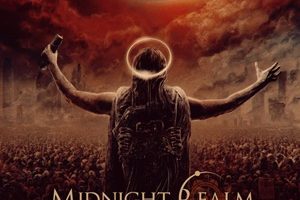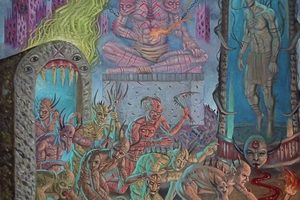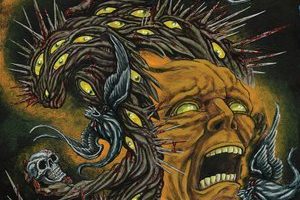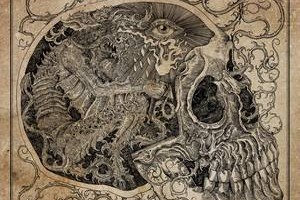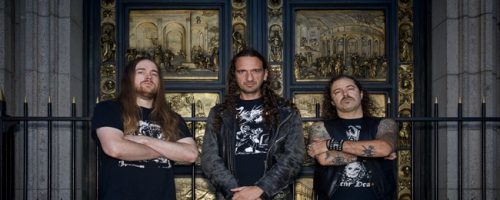Cognizance – Upheaving Brutality
Sunday, 10th October 2021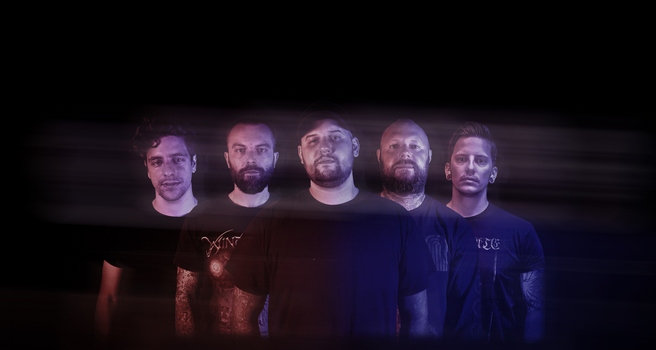
A band that really took the time to build themselves up over the years, Cognizance released a number of short EPs and singles before jumping into full-length waters. That said, they recently released their second full-length, Upheaval, and it masterfully combines tech-death insanity with some noticeable brutality to it. It’s abrasive while still tickling the eardrums with fanciful guitarwork. We spoke with guitarist Alex Baillie about the new album, their Claymation video, injecting technical writing while keeping it memorable and heavy, and much more.
Dead Rhetoric: Do you think that putting out a number of small releases before 2019’s Malignant Dominion was helpful in crafting the band’s sound?
Alex Baillie: Yeah, I mean it let us experiment with quite a few different things – being a band that doesn’t tour, having a consistent stream of music coming out helps you stay relevant, so to speak. It let us try for example before we got David [Diepold] on drums, we had a few different drummers we played with. We have been to a few different producers, which carved a different sound for each release as well. There are some that we used once, some a few times, and some that we used once and then went back to and it all helped us shape the sound as well as finding what we liked or didn’t like so much and try again. So the short releases were a really good move for us.
Dead Rhetoric: What do you feel distinguishes Upheaval from Malignant Dominion?
Baillie: I think that this one is more consistent in the feeling of the songs. But each song at the same time has a bit of a different feeling rather than it sounding like a slightly different version of the previous one, whereas the last album – some of those songs, or at least the riffs, were written years before the album came out and they were pieced together over a period of time. The recording for that album was like that as well. It was recorded over 9 months. The rhythm guitars were recorded in one chunk. The bass was done, and then the vocals were done over months and months in my place. It’s cool, but I have a neighbor here on either side of me and above me too, and it made us really self-conscious about what we were doing, and probably didn’t give it as much full energy as we could have.
So this album feels more cohesive in the feel of the songs complementing each other, but also from a performance point of view, it is a lot better. Again, even though we have done a lot of releases and recordings, it was the first full album as a band, so it was taking from the bits we had learned and parts you wanted to improve on, and we achieved that with this album. The new one is also a lot more to the point. The last one took in quite a few songs, and Upheaval is a more chaotic record I would say. Right now, that was the music that came out. Next time, I don’t know where we will go, but that’s the vibe for this release.
Dead Rhetoric: What challenges did COVID bring for writing the album?
Baillie: This recording was a lot more well-organized and regimented than the last one. There are a lot of different factors for it. First of all, it was another album where at any one time, none of us were in the same room together. Every recording that we have done, there has not been a moment when we have always been together. Namely, because the drums are always done in a studio abroad. But this time, we did want to record in Austria with David, or have him come to the studio where we were. But COVID played a part in that. It’s also about where David is most comfortable and relaxed in order to get the best performance. He usually does his recordings quite quickly. Like over a few days. At the end of the day, if he is going to record more quickly and play better by being closer to home, there’s no need to change that.
In terms of the other instruments and vocals, I have always enjoyed the idea of just carving out some time to just focus on recording. Last time, I took time off work to just sit and do the guitars, but I was still at home. There’s a lot of distractions that come with being at home. This time, we rented a small cottage which we got really lucky with. The room almost felt like a barn. But we rented it and it was a few hours from here in a really small village. It was a beautiful place! It was the middle of nowhere, nothing for miles and miles and without phone reception. There was a shop that was open for a few hours, a small café, and a few pubs. The nearest grocery store was like 30 minutes.
We spent two weeks doing guitars, then our bass player came in on the weekends to do his parts, and it was great. We took all our gear, made a rig, and really just locked it down. We had set times to record things but if we weren’t feeling it, we would come back to it. When you have a time limit – 14 days – which sounds like a lot of time but if you want to be meticulous it goes quickly. Your ears get fatigued quickly. Just being out where you can go walking, or have some of the purest air, to reset your ears and reset your brain – it really worked, especially when the album is as intense and busy as it is. The vocals had to be done in a bit of a broken up fashion again due to COVID. Fortunately a friend had some space, an office that he worked at, we would go in the evenings to do some vocals. Then we went into lockdown and had to stop.
Unfortunately, deadlines had arrived so Frederick was mixing the album while we were still recording the vocals. As a consequence, we did have to rush the vocals a little bit. I don’t really think it hindered the end result, because we just went with it in the heat of the moment rather than overanalyzing, which is easy to do. That was difficult, but we were in a space where we could make as much noise as we wanted, and a bit of a time limit in how long we were there for each session. So we focused as much as possible. Our singer isn’t always the most focused person, so having the time limit helped with that as well. So it was still disjointed, but it was actually an improvement for us.
Dead Rhetoric: Where does the lyrical inspiration come from?
Baillie: For every song on the new album, besides “Fever Dream” and “Oneiric,” I wrote the lyrics. To be honest with you, there are various inspirations. It’s hard for me to summarize in general. A few favorites – I guess the two that really tie together, and we have had a few concepts that tie together but for the most part, it’s usually just short stories rather than an overarching idea that ties things together. There is “Syntheticus I and II” and they are a concept track which is about this android that gets dumped. It’s thrown in the trash. The idea is that it is still active and it starts to repair itself, while staring to question its purpose and the nature of its existence. It can be its own master, as to being a slave previously for human needs. It goes through this process of rebuilding itself and trying to escape from this junkyard. It is not only fighting the fact that it is very damaged, but it is also challenged by the earthly elements like wind and rain.
It eventually escapes and feels that it has found a new start to do what it wants. The twist in the video is that it tries to reintegrate itself into society, as it feels that it should have the same stature as a human, but all of the humans are repulsed by it. Ultimately, it doesn’t know what to do with itself, and at the end of the music video, it crawls back into the sewers and it leaves on a bit of a cliffhanger. You don’t really know what happens to it. The tone of that was our excess consumption, and the case of us getting one thing in our life as a material possession and then you instantly link to this conveyor belt of wanting the next thing. I am as guilty as anyone of that – I get new guitar or piece of equipment, and then instantly I need something to go with it. People just throw things in the garbage and forget about it when it may be perfectly fine. It all goes somewhere, you know? That was one song.
Then I really enjoy writing about geo-political commentary so there is a song called “Decaying Gods,” which is basically about a certain country in the Far East, and their country has these re-education camps and essentially the protagonist of the song is kidnapped and taken to this place where they are kept in a cell and brainwashed. They pledge their allegiance to a particular organized religion and the song comes from that faith and understanding of the religion starts to decay as that person is brainwashed through the process they go through.
Dead Rhetoric: You don’t see a lot of Claymation videos. How did the video for “Syntheticus II – Refuge” come about?
Baillie: We got to a point where the mix and master was done. This was like January this year – the album was done. We are a small band in a very oversaturated genre, and we needed something to help us shine through, but also really says something about us as a band. I feel that we have our own unique flavors, even if we can be pigeonholed in a genre. So we wanted to do some studio playthrough videos, which we have done before and it’s pretty much the standard. I’m not big on conventional music videos, where the band is literally moshing in a room. It’s been done a million times, and it’s fine, but it’s not really us. So we wanted to come up with something different.
I had seen this guy who had done all these Claymation videos, which was Shane at Budget Blood Productions. He did a song for Ingested and it was an incredible video. The amount of detail and amount of time that went into it – I didn’t think that realistically we would be able to afford it. But I started talking to Shane about the concept of the song, and felt he could do something really cool with it. We were able to work something out, and he needed like 3-4 months to do the video. We got really lucky. He liked the band and he liked the idea. We just wanted something that was different, something unique, and something memorable. It was also something that we were generally into as a band, not just doing it for the sake of a visual. I am really happy with how it came out. I have worked with a bunch of different people over the last few years, and he was one of the people – even though he isn’t a very well-known guy, which is a crime in and of itself, he was the most professional, hardworking dude that I have come across in a long time. It was such an enjoyable experience seeing all the updates and seeing it all come to life – to really collaborate on this video idea.
Dead Rhetoric: What’s important in nailing a mix between something that’s heavy but still very technical?
Baillie: First of all, the thing to address – when I write, maybe I did a long time ago, but I never do it now – I don’t try to make something technical for the sake of being technical. I want it to be musical and enjoyable to listen to. In terms of the other aspects, I think everything is there to complement it, and to refresh you from what you just heard. There’s might be a melodically complex line and then you go into a groove. It’s that relief and pulling everything together and letting it have its moment. Whereas if it is the same all throughout, it gets really dull and you just become accustomed to it. If you play these factors up against each other, it’s more of a push-pull feeling in the music. It keeps it unpredictable.
Aside from all that, I and the other guys listen to a lot of different types of music. The older I get, the less metal I listen to, but I still really enjoy composing and writing it. For me, it’s about the other genres that I enjoy – what can I take from there and put into a death metal context? That plays a part in it as well.
Dead Rhetoric: I know you just mentioned that you don’t listen to as much as you used to, but are there a few bands that you feel are really doing technical death metal the right way that stand out?
Baillie: I don’t stay too close to a lot of the newer bands that are emerging on the scene. I have a short attention span to it. I give it a quick 30 seconds and if it doesn’t grab me, I normally don’t stick with it. The bands that I think influenced me, and are bringing out music from me – ones that are still coming out with killer albums: Revocation are an amazing example. The last three albums they have gone in a more death metal route but it’s a great example of how we like to play. There’s tech, thrash, progressive, and death metal bits in it. I think that they are a great example of modern extreme death metal. I think some of the bands that pushed the envelope – some push the envelope in terms of speed and just get faster and faster, which can be boring now. There’s no feeling to it at all. Anyone can keep going faster and faster, it’s not impressive. But there are a lot of people who are really into that, and I don’t want to say names, but there’s an argument to say that they are pushing the envelope.
For me, it’s more about songwriting. The melodic and harmony that they use to keep it interesting. The last Obscura album, Diluvium, was way ahead of its time with some of playing on there. It uses colors that you don’t hear much in the genre. To me, that’s a very special album. I think Fractal Universe, from France, they are a band doesn’t have a huge following but they are pushing the envelope harmonically, melodically, and with production – their production is really unique. It’s not fatiguing to listen to. I think Aborted are very good at what they do as well. They have been on the go for a long time, but certainly on the last 3-4 albums they have come up with this speed thing – they are the guys that have the sweet spot on the speed. It’s more grind-y and it doesn’t feel super tech-y even though it is technical. It’s just the most brutal stuff out there, but they have the groove going as well. Those are some more standout ones for me.
I’d love to be pleasantly surprised when I hear new bands, but for me where I am at right now, I have heard so much – bands are using the same colors, and the production doesn’t really do it for me. Another band I want to shout out is The Zenith Passage. Those guys are killer, and Justin does similar jazz fusion stuff like I do, and the way he puts it into The Zenith Passage really does it for me. He’s another guy that is using more colors that aren’t really used in the genre. That’s what it is all about now. It’s not about the speed, but bringing in different flavors to the music.
Dead Rhetoric: What do you like about death metal, and writing in that format?
Baillie: I think it’s the power of writing what you want to hear. It’s the control of being able to sculpt something into what you are looking for within the boundaries of what you can play. It challenges me, don’t get me wrong, and there are tons in our music that is super cliché and typical but at the same time, I am really conscious when I am writing, at least from my point of view, I am trying not to repeat things too much. I am trying to integrate some slightly different elements whether the listener picks up on it or not. It makes it a challenge. We probably could have pumped out more material over the years if we hadn’t been so self-conscious, and don’t get me wrong, once you reach the finish line it doesn’t always come out the way you want it to. But maybe it’s the fact that I’m really picky about what I like now. I am picky about what I put out there. The recordings for this band for the first EP were 10 years ago, and in the grand scheme of things that isn’t that long, but it’s important for us in being the type of band that we are – not a professional touring band – to utilize that sort of freedom that we have to carve something that is truly our own and not material by numbers.
Dead Rhetoric: What are your plans for the band for the fall and 2022?
Baillie: In all honesty, we would like to play some shows. But we are creating music – I already have a few songs under my belt, so it’s just a continuous creative process. In terms of supporting the album, it would be cool to do a few shows here and there, most likely next summer or a little before. We will be doing as much content for this album as people want to see. If there’s a demand for your typical guitar videos, then we will do that. If there’s a way for the nerds out there, for talking interactively through the songs, or dissecting them, then we will totally do that.
For us, it is about being creative in how we put content out there to support an album. There will be a documentary about the making of the album later this year. We are putting out brief shots now leading to the release of the record, and later this year there will be a more in-depth look at it as well. For us, it’s about continuing the creative process. For me, I haven’t stopped writing for the last 10 years, so maybe I should take a little time off to refresh the batteries a bit. We will see what happens. Nothing is set in stone, and ultimately we have to see how the record is received by the fans. Hopefully we will pick up some new fans and go from there.











